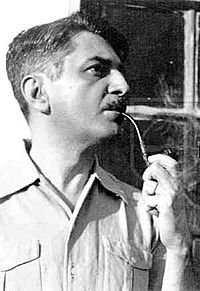Gilberto Freyre facts for kids
Quick facts for kids
Gilberto Freyre
|
|
|---|---|

Gilberto Freyre c. 1956
|
|
| Born |
Gilberto de Mello Freyre
March 15, 1900 |
| Died | July 18, 1987 (aged 87) |
| Alma mater | Baylor University Columbia University |
| Known for | Casa-Grande & Senzala, concept of racial democracy |
| Awards | Prêmio Machado de Assis, Prêmio Jabuti |
| Scientific career | |
| Fields | Sociology, Historian, Anthropology, Writer |
| Signature | |
Gilberto de Mello Freyre (March 15, 1900 – July 18, 1987) was an important Brazilian sociologist, anthropologist, and historian. He was also a writer, painter, journalist, and even a congressman. Freyre was born in Recife, Brazil.
He is seen as one of the most important sociologists of the 20th century. His most famous book is Casa-Grande & Senzala. Its English title is The Masters and the Slaves.
Contents
Life and Career
Gilberto Freyre had a wide-ranging academic career. He studied at Baylor University in Texas from age eighteen. Later, he went to Columbia University where he earned his master's degree. At Columbia, he learned from the famous anthropologist Franz Boas.
Early Work in Brazil
After returning to Recife in 1923, Freyre led a group of writers. They started a movement focused on Brazilian regional culture. He worked a lot as a journalist. Later, he became the chief of staff for Estácio Coimbra, who was the Governor of Pernambuco.
In 1930, a revolution happened, and Getúlio Vargas came to power. Because of this, both Coimbra and Freyre had to leave Brazil. Freyre first went to Portugal. Then he moved to the United States, where he was a visiting professor at Stanford University. By 1932, Freyre was back in Brazil.
The Masters and the Slaves
In 1933, Freyre's most well-known book, The Masters and the Slaves, was published. It was very popular and seen as a new way to study races and cultures in Brazil.
However, this book has also faced criticism. It suggested that slavery in Brazil was not as harsh as it truly was. It also helped create the idea of Brazil as a "racial democracy." This idea suggests that there is no racism in Brazil because different races have mixed. Critics say this idea hides the real racism that exists in modern Brazil.
The Masters and the Slaves was the first of three books. The others were The Mansions and the Shanties (1938) and Order and Progress (1957). These three books are considered important works in cultural anthropology and social history. Freyre also wrote other key books, like The Northeast (1937) and The English in Brazil (1948).
Later Life and Recognition
In 1946, Freyre was elected to the federal Congress in Brazil. He also directed newspapers like A Província and Diário de Pernambuco.
In 1962, Freyre received the Prêmio Machado de Assis. This is one of Brazil's most respected literary awards. In the same year, he joined the American Philosophical Society. Throughout his life, Freyre earned many awards and honors from Brazil and other countries. These included honors from France, Great Britain, and Portugal. He also received honorary degrees from Columbia University and the Sorbonne.
Controversial Views
Freyre's public opinions were sometimes controversial. In the 1930s, some people called him a communist. But later, he moved to the political right. In the 1950s, he supported Portugal's government under Antonio de Oliveira Salazar. After 1964, he defended Brazil's military dictatorship led by Humberto Castelo Branco.
Freyre is known as the "father" of lusotropicalism. This theory suggests that the mixing of different races in Brazil was a positive thing. At that time, mixing races was often seen negatively by some thinkers.
Writing Style and Legacy
Freyre was also praised for his writing style. The Brazilian poet Manuel Bandeira admired Freyre's poem "Bahia of all saints and of almost all sins." Freyre wrote this long poem after visiting Salvador for the first time.
Gilberto Freyre passed away on July 18, 1987, in Recife.
See also
 In Spanish: Gilberto Freyre para niños
In Spanish: Gilberto Freyre para niños
- Lusotropicalism
- Mixed Race Day
- Research Materials: Max Planck Society Archive
Images for kids
 | Selma Burke |
 | Pauline Powell Burns |
 | Frederick J. Brown |
 | Robert Blackburn |

